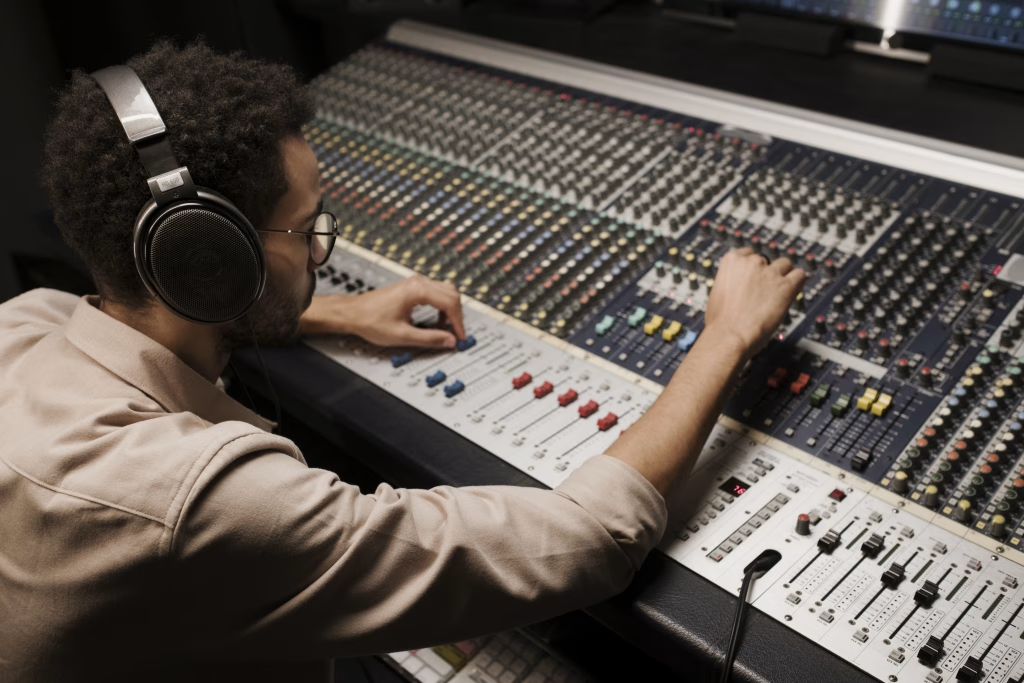Guides, Knowledge Base
Amplifying Success: Top Tips for Professional Sound Engineers in Kenya
The vibrant music scene in Kenya is a tapestry of diverse sounds, from the energetic beats of Afrobeats and Gengetone to the soulful melodies of Benga and Gospel. At the heart of this sonic landscape are the professional sound engineers, the unsung heroes who sculpt, refine, and deliver these auditory experiences to eager audiences.
Navigating the unique challenges and opportunities within the Kenyan entertainment industry requires more than just technical expertise. It demands adaptability, cultural understanding, and a commitment to continuous growth. Whether you’re mixing live performances in Nairobi’s bustling clubs, recording in studios across the country, or designing soundscapes for film and television, these top tips will help you amplify your success as a professional sound engineer in Kenya:
1. Master the Art of Resourcefulness:
In Kenya, access to the latest and greatest equipment might sometimes be limited or come with significant logistical hurdles. The best sound engineers here are masters of resourcefulness.
- Learn to work with what you have: Become intimately familiar with your existing gear. Understand its limitations and find creative ways to maximize its potential. Don’t be afraid to experiment and find innovative solutions.
- Build a strong network of rental companies and technicians: Knowing who has what equipment and who can fix it quickly is invaluable. Cultivate these relationships and be prepared to source gear when needed.
- Embrace DIY and improvisation (when appropriate): Sometimes, a quick fix or a creative workaround is necessary to keep a session or show running smoothly. Develop your problem-solving skills and be prepared to think outside the box.
2. Understand the Local Soundscape and Cultural Nuances:
Kenyan audiences have a unique sonic palate. Understanding the nuances of popular genres, the desired energy levels, and the cultural significance of sound is crucial.
- Immerse yourself in Kenyan music: Listen actively to different genres, attend local performances, and engage with musicians to understand their sonic vision.
- Pay attention to audience expectations: Observe how different audiences react to sound levels and frequencies. Adjust your mixing accordingly to create an engaging and enjoyable experience.
- Respect cultural sensitivities: Be mindful of sound levels and content, especially in culturally sensitive environments or during specific events.
3. Build Strong Relationships and Communication Skills:
In a relationship-driven industry like Kenya’s entertainment scene, your network is your net worth.
- Collaborate effectively with artists and production teams: Clear and open communication is paramount. Understand the artist’s vision, provide constructive feedback, and work collaboratively to achieve the desired sound.
- Be a team player: Sound engineering is often part of a larger production. Be respectful of other crew members, be punctual, and contribute positively to the overall atmosphere.
- Network actively: Attend industry events, connect with other professionals, and build genuine relationships. Word-of-mouth referrals are often a significant source of work.
4. Adapt to Diverse Environments and Power Challenges:
From outdoor concerts in remote locations to intimate indoor gigs in Nairobi, Kenyan sound engineers often work in diverse and sometimes challenging environments.
- Be prepared for varying acoustic conditions: Learn how to analyze a space quickly and make necessary adjustments to your setup and mixing techniques.
- Understand power management: Power fluctuations and outages can be common. Invest in reliable power solutions (generators, UPS) and learn how to troubleshoot power-related issues.
- Develop skills in setting up and tearing down quickly and efficiently: Time is often a critical factor, especially during live events. Practice your setup and teardown routines to minimize downtime.
5. Embrace Continuous Learning and Professional Development:
The world of audio technology is constantly evolving. Staying ahead of the curve is essential for long-term success.
- Stay updated on new technologies and techniques: Read industry publications, attend workshops and seminars (both online and in person), and experiment with new software and hardware.
- Seek mentorship from experienced engineers: Learning from those who have navigated the Kenyan sound landscape can provide invaluable insights and guidance.
- Share your knowledge and mentor aspiring engineers: Contributing to the growth of the local sound engineering community strengthens the entire industry.
6. Prioritize Safety:
Working with audio equipment involves potential safety hazards.
- Practice safe lifting and handling techniques: Protect yourself from physical injuries when moving heavy gear.
- Be mindful of electrical safety: Ensure all equipment is properly grounded and take precautions to avoid electrical shocks.
- Promote hearing safety: Encourage responsible listening levels for both performers and audiences and consider using hearing protection yourself.
7. Be Professional and Ethical:
Maintaining a high level of professionalism and ethical conduct is crucial for building a reputable career.
- Honor your commitments: Deliver on your promises and be reliable.
- Be fair and transparent in your dealings: Maintain ethical business practices.
- Respect intellectual property: Ensure proper licensing for any software or copyrighted material you use.
Conclusion:
A career as a professional sound engineer in Kenya is both rewarding and demanding. By embracing these top tips, honing your technical skills, and cultivating strong relationships within the vibrant local music scene, you can amplify your success and contribute to the rich sonic tapestry of the nation. Remember that passion, dedication, and a willingness to learn and adapt are the keys to long-term fulfillment and recognition in this dynamic field. Now go forth and make some beautiful noise!

